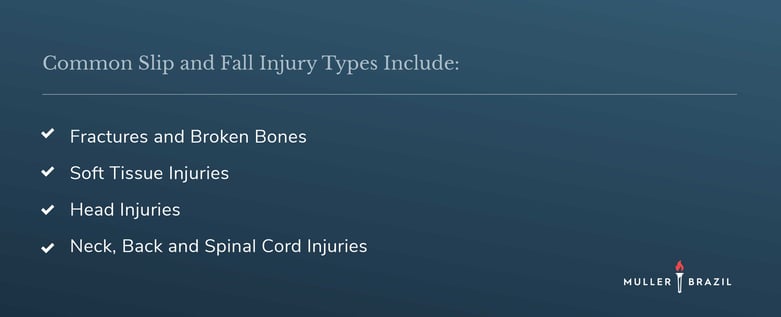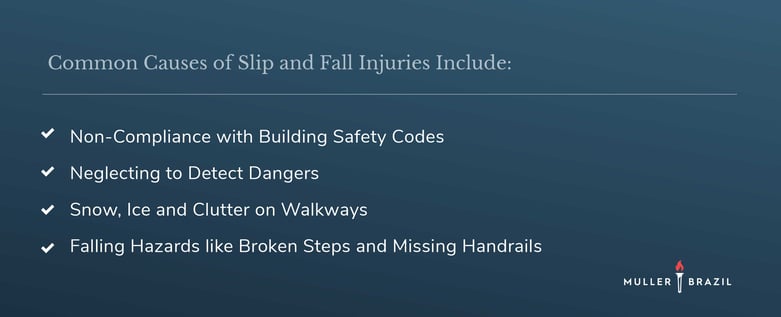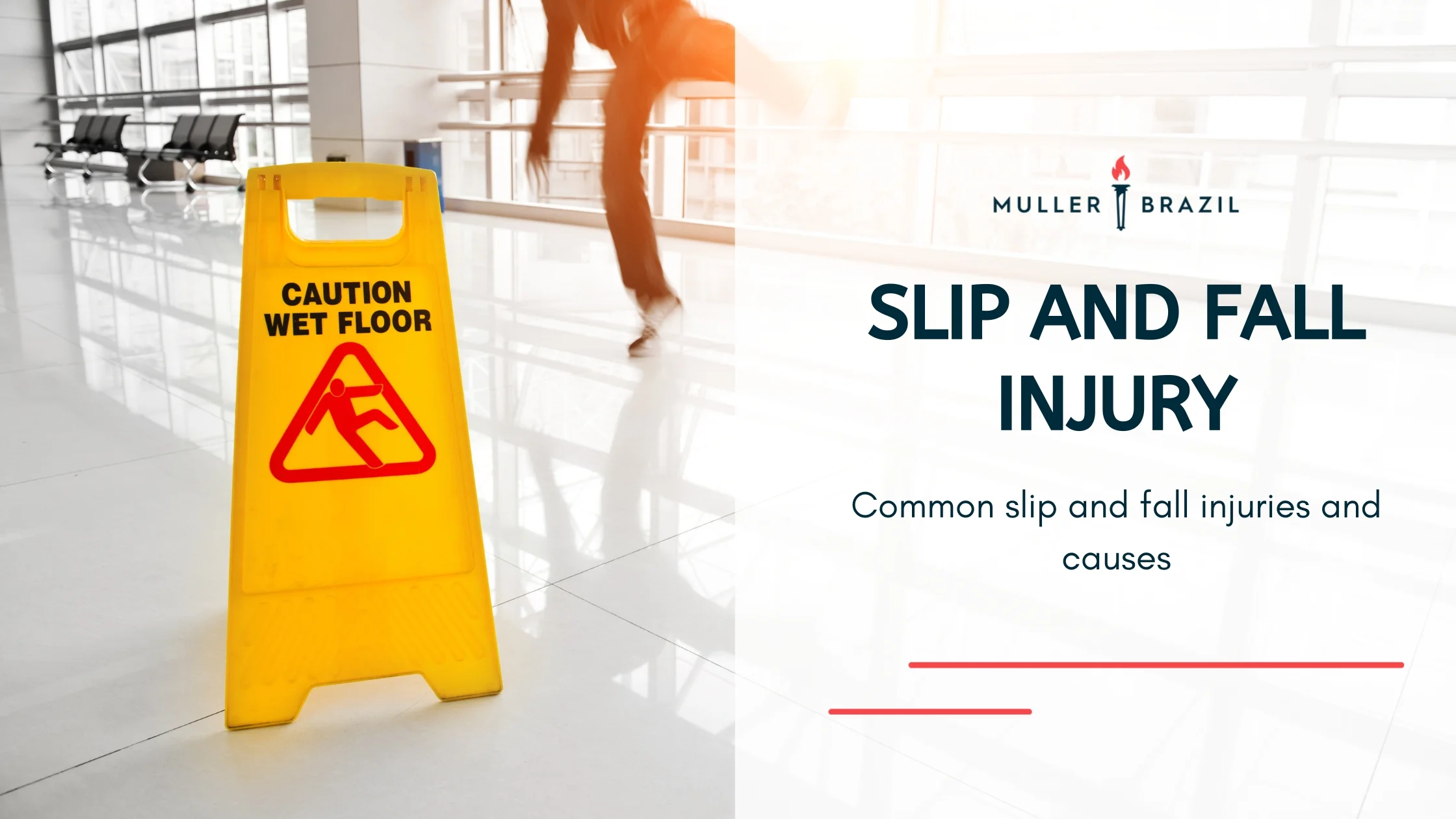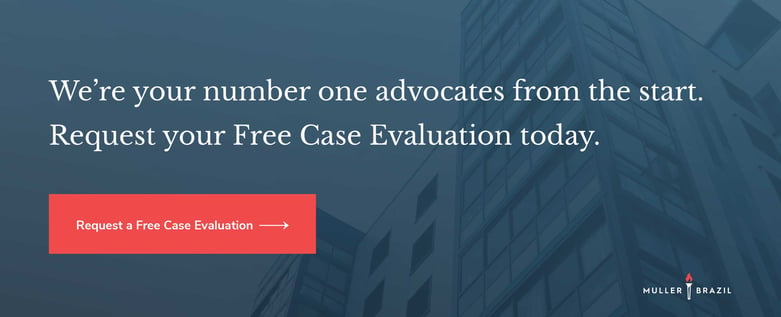4 min read
Slip and Fall Injury Guide | Legal Help from Muller Brazil
![]() Laura Levenberg, Esquire
Apr 6, 2022 12:56:37 PM
Laura Levenberg, Esquire
Apr 6, 2022 12:56:37 PM
Slip and fall accidents can happen anywhere, often leading to severe injuries that require medical attention and can affect your quality of life. Property owners have a legal duty to maintain safe premises and warn visitors of potential hazards. When they fail to do so, they can be held liable for any resulting injuries.

Understanding the risks and common types of injuries can help you stay vigilant and protect yourself. If you suffer a slip and fall injury, a skilled lawyer can help you secure the compensation you deserve.
The Dangers of Slip and Fall Injuries
Slip and fall accidents are more common than many people realize. According to the National Floor Safety Institute (NFSI), falls account for over 8 million hospital emergency room visits annually, making them the leading cause of visits (21.3%). Additionally, falls are the second leading cause of accidental death worldwide, pointing out the serious nature of these incidents.
Common Types of Slip and Fall Injuries
Fractures and broken bones
Approximately 5% of slip and fall accidents result in fractures and broken bones. These injuries are particularly prevalent among older adults, with hips, wrists, and ankles being the most commonly affected areas. Other susceptible areas include:
- The elbow
- Foot
- Shoulder
- Hand
- Pelvis
- Forearm
- Knee
- Lower leg
Fractures can cause severe pain, extended recovery periods, emotional distress, and substantial medical expenses.
Soft tissue injury
Soft tissue injuries involve damage to muscles, tendons, and ligaments. Common types include sprains, strains, and contusions. The severity of these injuries varies widely, with some requiring only rest and basic treatment, while others may need extensive therapy or surgical intervention. It is important to seek medical attention to assess the injury's extent and receive appropriate care.
Head injuries
Head injuries are among the most serious outcomes of a slip and fall. They can range from concussions to traumatic brain injuries (TBIs) and skull fractures. Even minor head injuries can have lasting effects, particularly if the individual is on blood thinners. Symptoms might not be immediately apparent, making it essential to monitor for any signs of head trauma following a fall.
Neck, Back, and Spinal Cord Injuries
Injuries to the neck, back, and spinal cord can be particularly debilitating. Common injuries include:
- Muscle strains
- Neck sprains
- Whiplash
- Herniated discs
- Fractured vertebrae
Spinal cord injuries can result in loss of function, chronic pain, and other serious complications. The severity of these injuries often depends on the extent of the damage and any preexisting medical conditions.

Leading Causes of Slip and Falls
Negligent Property Maintenance
Property owners have a duty to maintain their premises in a reasonably safe condition, also known as premises liability. This includes repairing or warning about hazards such as broken steps, missing handrails, and wet floors. Failure to do so can result in slip and fall accidents.
Non-Compliance with Building Safety Codes
Issues with a building's design, construction, and compliance with safety codes can lead to slip and fall accidents. Property owners, landlords, and operators must adhere to local, state, and national building codes to mitigate risks.
Neglecting to Detect Dangers
Property owners must regularly inspect their premises for potential hazards. If a dangerous condition is found, they must repair it or adequately warn visitors. Failure to do so can result in liability for any injuries sustained.
Snow, Ice, and Clutter on Walkways
In areas prone to snow and ice, property owners must ensure reasonable measures are taken to clear walkways. Pennsylvania's "hills and ridges" doctrine requires proof that snow or ice accumulated to an extent that it posed a danger to pedestrians.
Falling Hazards
Businesses and property owners can prevent injuries by addressing hazards such as loose floorboards, cluttered walkways, and inadequate lighting. Implementing warning signs and non-slip strips can significantly reduce the risk of falls.
Contact Us Now
What Should You Do After Falling on Someone Else’s Property?
If you fall on someone else’s property, it's important to take the following steps:
- Seek Medical Attention: Your health is the priority. Get medical help immediately, even if you think your injuries are minor.
- Report the Incident: Notify the property owner or manager about the accident as soon as possible.
- Document Everything: Take photos of the scene, your injuries, and any hazards that contributed to the fall. Gather contact information from any witnesses.
- Keep Records: Maintain a record of your medical treatments, expenses, and any correspondence related to the accident.
- Consult a Lawyer: A slip and fall injury lawyer can help you understand your rights and the next steps in seeking compensation.
Can I Claim Compensation for Damages After a Slip and Fall Accident?
Yes, you can claim compensation for damages if you have been injured in a slip and fall accident due to someone else's negligence. Compensation can cover medical bills, lost wages, pain and suffering, and other related expenses. Consulting with a lawyer will help you evaluate your case and pursue the compensation you deserve.
How Can a Personal Injury Lawyer Help With Slip and Fall Injuries?
A personal injury lawyer can provide assistance by:
- Evaluating Your Case: Determining the viability of your claim and the potential value.
- Gathering Evidence: Collecting necessary documentation, witness statements, and expert testimonies to build a strong case.
- Negotiating with Insurance Companies: Handling communications and negotiations to ensure you receive fair compensation.
- Representing You in Court: Advocating on your behalf if your case goes to trial.
Final Remarks
Slip and fall accidents can have serious consequences, but understanding the risks and taking preventive measures can help reduce the likelihood of injury. If you or someone you know has been injured in a slip and fall accident, seeking legal assistance is key to making sure that you receive the compensation you deserve. Contact us at Muller Brazil for a free consultation today.
Frequently Asked Questions
What happens to your body when you slip and fall?
When you slip and fall, your body can experience a sudden impact that may result in various injuries, such as fractures, sprains, and head trauma. The severity depends on factors like the fall's height, the surface you land on, and your body's position during the fall.
What type of injuries are likely from a slip and fall?
Common injuries from slip and falls include fractures, soft tissue injuries, head injuries, and spinal cord injuries. The specific injury type often depends on how you fall and the conditions of the environment.
What is the most common injury from a fall?
Fractures, particularly of the hip, wrist, and ankle, are among the most common injuries from falls. These injuries are especially prevalent in older adults.
What are the injuries from slips, trips, and falls?
Injuries from slips, trips, and falls can range from minor bruises and sprains to severe fractures, head injuries, and spinal cord damage. Each incident's specific circumstances will dictate the injury's nature and severity.
Sources:
- Falls account for over 8 million hospital emergency room visits annually, making them the leading cause of visits (21.3%), https://nfsi.org/nfsi-research/quick-facts/
- Approximately 5% of slip and fall accidents result in fractures and broken bones, https://nfsi.org/nfsi-research/quick-facts/
Meet the Author
Laura Levenberg - Associate Attorney
Laura J. Levenberg is a vaccine injury lawyer at My Vaccine Lawyer. Prior to joining My Vaccine Lawyer, Ms. Levenberg worked as a trial attorney at a litigation firm specializing in personal injury matters, primarily arising from motor vehicle accidents and slip/trip and fall incidents. Laura has successfully represented clients in all stages of litigation, including depositions, negotiations, motion practice, oral arguments, arbitrations, and trial. Laura also serves as a certified arbitrator in Philadelphia County.
Learn more about Laura J. Levenberg ⇒



